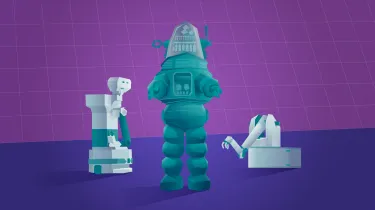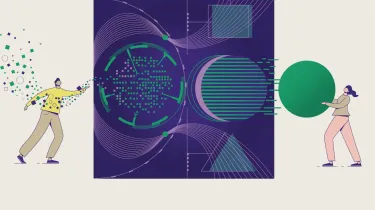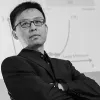Machine Learning
Machine Learning is a central subfield of artificial intelligence. Many digital applications in our daily lives use machine learning: spam filters sort out unwanted emails, streaming services recommend suitable content, and voice assistants respond to spoken requests. In all these cases, the systems use large amounts of data to recognise patterns and derive decisions from them.
Discover now on the AI Campus how different algorithms and learning methods work, what they are suitable for, and how you can use them in a targeted way.

Holistic applied AI in engineering – machine learning in production
Methods of AI – Machine Learning

Machine Learning

Gabriela Molinar studied electrical engineering and information technology in Venezuela. She received her doctorate in 2020 from the Institute for Information Processing Technology (ITIV) at the Karlsruhe Institute of Technology (KIT) and now works in the energy sector at the transmission system operator TenneT TSO GmbH in Bayreuth.
She received the 2022 Ecology Award of the Viktor & Sigrid Dulger Foundation for her work "Machine Learning Tool for Transmission Capacity Forecasting of Overhead Lines based on Distributed Weather Data", which makes an important contribution to power load forecasting using artificial intelligence as an optimisation method for grid operation and to support the energy transition in Germany.
Building AI
Neural Networks

Prof. Abhinav Valada, a full professor at the University of Freiburg. He directs the Robot Learning Lab. His research lies at the intersection of robotics, machine learning, and computer vision with a focus on tackling fundamental robot perception, state estimation, and planning problems to enable robots to operate reliably in complex and diverse domains.

Frank Hutter is a Full Professor for Machine Learning at the University of Freiburg (Germany), as well as Chief Expert AutoML at the Bosch Center for Artificial Intelligence. Frank holds a PhD from the University of British Columbia (UBC, 2009) and a Diplom (eq. MSc) from TU Darmstadt (2004). He received the 2010 CAIAC doctoral dissertation award for the best thesis in AI in Canada, and with his coauthors, several best paper awards and prizes in international competitions on machine learning, SAT solving, and AI planning. He is a Fellow of EurAI and ELLIS, the director of the ELLIS unit Freiburg and the recipient of 3 ERC grants. Frank is best known for his research on automated machine learning (AutoML), including neural architecture search and efficient hyperparameter optimization. He co-authored the first book on AutoML and the prominent AutoML tools Auto-WEKA, Auto-sklearn and Auto-PyTorch, won the first two AutoML challenges with his team, co-organized the ICML workshop series on AutoML every year 2014-2021, has been the general chair of the inaugural AutoML conference 2022 and is general chair again in 2023.

Bernd Bischl holds the chair of Statistics and Data Science at the Department of Statistics at the Ludwig-Maximilians-University Munich and is a co-director of the Munich Center for Machine Learning (MCML), one of Germany’s national competence centers for Machine Learning (ML). He studied Computer Science, Artificial Intelligence and Data Sciences in Hamburg, Edinburgh and Dortmund and obtained his Ph.D from Dortmund Technical University in 2013 with a thesis on “Model and Algorithm Selection in Statistical Learning and Optimization”. His research interests include AutoML, model selection, interpretable ML, as well as the development of statistical software. He is a member of ELLIS in general, and a faculty member of ELLIS Munich, an active developer of several R-packages, leads the mlr (Machine Learning in R) engineering group and is co-founder of the science platform OpenML for open and reproducible ML. Furthermore, he leads the Munich branch of the ADA Lovelace Center for Analytics, Data & Application, i.e. a new type of research infrastructure to support businesses in Bavaria, especially in the SME sector.





